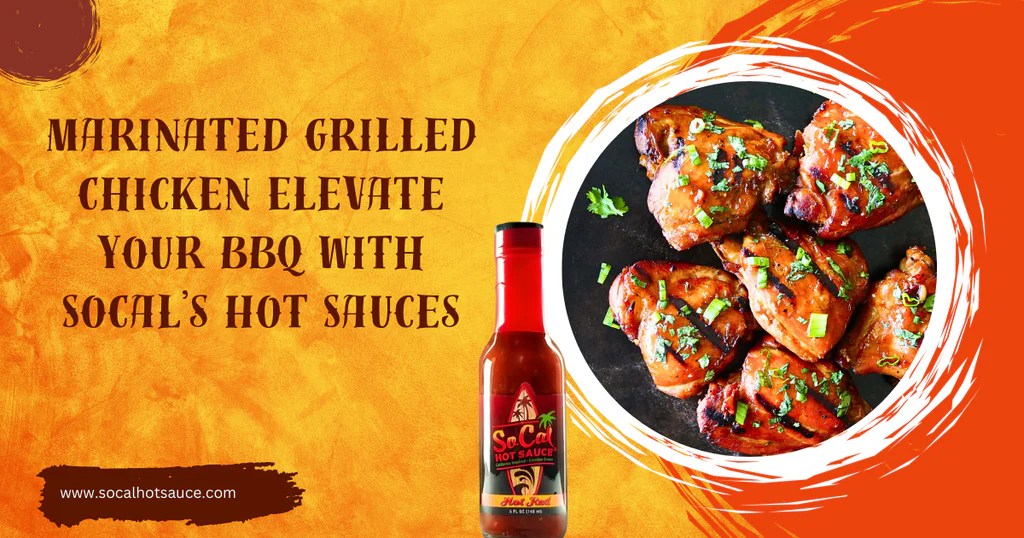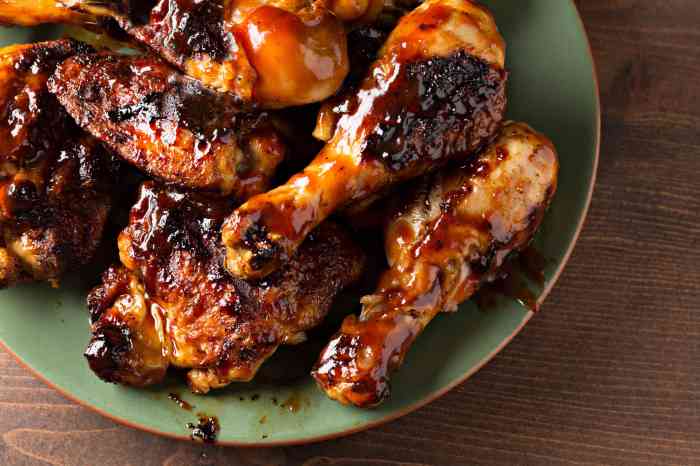Best BBQ Chicken Sauce Recipe A Flavorful Guide
A Deep Dive into BBQ Chicken Sauce: Best Bbq Chicken Sauce Recipe
Best bbq chicken sauce recipe – Barbecue chicken sauce, a staple in American cuisine, boasts a rich history and diverse regional variations. Its evolution reflects the melting pot of culinary influences that shaped the nation, from the indigenous traditions of smoking meats to the contributions of European settlers and African-American culinary practices. This exploration delves into the fascinating world of BBQ chicken sauce, examining its history, regional styles, essential components, and diverse recipes.
Introduction to BBQ Chicken Sauce
The origins of BBQ chicken sauce are intertwined with the history of barbecue itself. While pinpointing an exact origin is difficult, the development of various BBQ styles across the United States led to the creation of distinct sauce recipes. These sauces often reflect local ingredients and culinary traditions. Early versions likely involved simple combinations of vinegar, spices, and sweeteners, gradually evolving into the complex and diverse sauces we know today.
Regional variations are significant. The Carolinas are known for their vinegar-based sauces, often featuring a tangy, peppery profile. Kansas City-style sauces tend to be tomato-based, sweeter, and thicker. Texas offers a broader range, from vinegar-based to tomato-based and even some with a more Southwestern flair incorporating chipotle peppers. Each region’s unique sauce reflects the local palate and available ingredients.
Finding the best BBQ chicken sauce recipe often involves experimentation, but a great starting point is to consider the balance of sweet and smoky flavors. Many find that adapting a sauce from another application, like the tangy and delicious bbq burger sauce recipe , can be a surprisingly effective shortcut. By adjusting the sweetness and adding a touch more smoke, you can easily transform it into a phenomenal BBQ chicken sauce.
Most BBQ chicken sauces share fundamental components: a base (vinegar, tomato, or even fruit), a sweetener (sugar, molasses, honey), spices (paprika, black pepper, garlic powder, onion powder), and often a thickening agent (cornstarch, flour). The balance of these components determines the sauce’s overall flavor profile.
Sweet BBQ Chicken Sauce Recipes
This section details a classic sweet BBQ chicken sauce recipe and a brown sugar variation. The recipes highlight the importance of balancing sweet and savory flavors for optimal results.
| Ingredient | Quantity | Ingredient | Quantity |
|---|---|---|---|
| Ketchup | 1 cup | Brown Sugar (Variation) | 1/2 cup |
| White Sugar | 1/2 cup | Apple Cider Vinegar | 1/4 cup |
| Apple Cider Vinegar | 1/4 cup | Worcestershire Sauce | 1 tablespoon |
| Worcestershire Sauce | 1 tablespoon | Liquid Smoke | 1 teaspoon |
| Dijon Mustard | 1 tablespoon | Garlic Powder | 1 teaspoon |
| Paprika | 1 tablespoon | Onion Powder | 1 teaspoon |
| Black Pepper | 1/2 teaspoon | Cayenne Pepper (Optional) | 1/4 teaspoon |
| Garlic Powder | 1 teaspoon | ||
| Onion Powder | 1 teaspoon |
Instructions: Combine all ingredients in a saucepan. Bring to a simmer over medium heat, stirring frequently. Reduce heat to low and simmer for 15-20 minutes, or until thickened. The brown sugar variation provides a richer, more complex sweetness compared to white sugar, adding a caramel-like depth of flavor. Achieving the perfect balance involves adjusting the amount of sweetener and vinegar to achieve the desired level of sweetness and tang.
Spicy BBQ Chicken Sauce Recipes
This recipe utilizes a blend of chili peppers to create a spicy BBQ chicken sauce with adjustable heat. The spiciness can be tailored to individual preferences by varying the types and quantities of chili peppers.
A recipe might include chipotle peppers in adobo sauce for smoky heat, cayenne pepper for a fiery kick, and a touch of ancho chili powder for depth. The level of spiciness can be adjusted by increasing or decreasing the amount of chili peppers used. For example, adding more cayenne pepper will increase the heat, while reducing the amount will make it milder.
Different chili peppers offer distinct flavor profiles. Chipotle peppers offer a smoky heat, while jalapeños provide a fresh, vibrant heat. Cayenne peppers deliver a sharp, intense heat, while ancho chili powder contributes a deeper, earthier heat with less intensity.
Smoky BBQ Chicken Sauce Recipes, Best bbq chicken sauce recipe

Source: socalhotsauce.com
Achieving a smoky flavor is crucial for many BBQ enthusiasts. This section explores using liquid smoke and alternative methods to achieve that characteristic smoky taste.
A recipe using liquid smoke would involve adding a small amount (1-2 teaspoons) to the sauce during the simmering process. The amount of liquid smoke should be adjusted according to desired smokiness. Too much can overpower the other flavors. Alternatively, grilling the chicken before applying the sauce imparts a natural smoky flavor. Using wood chips in a smoker or even charring the chicken on a grill can add a more authentic smoky taste than liquid smoke.
The flavor profile differs significantly. Liquid smoke offers a convenient, consistent smoky flavor, while grilling techniques provide a more nuanced, complex smokiness that varies depending on the wood type and grilling method. Grilling provides a more natural and potentially more intense smoky flavor, but may not be as easily controlled as liquid smoke.
- Liquid Smoke: Consistent, readily controlled smoky flavor, potentially artificial tasting.
- Grilling/Smoking: More nuanced, complex smoky flavor, potentially more intense, but less consistent.
Unique BBQ Chicken Sauce Recipes
This section explores recipes that move beyond the traditional, incorporating unique flavor combinations.
A fruit-based BBQ sauce might incorporate peaches or apricots for a sweet and tangy profile. A balsamic vinegar-based sauce would offer a sophisticated, slightly acidic base, complemented by herbs like rosemary or thyme. A honey-mustard BBQ sauce combines the sweetness of honey with the tang of mustard for a unique flavor combination. Each of these variations offers a distinctive taste experience, expanding the possibilities of BBQ chicken sauce beyond the classic tomato or vinegar-based options.
Visual Guide to BBQ Chicken Sauce Making
The visual cues during the cooking process are essential for achieving the desired consistency and flavor. The color should deepen as it simmers, progressing from a lighter hue to a richer, darker shade. The consistency should thicken as the sauce reduces, transitioning from a thin, watery liquid to a thicker, more viscous consistency. The texture should be smooth and glossy, free from lumps or clumps.
A properly made sauce will coat the back of a spoon and leave a thin film. The sauce is ready when it coats the back of a spoon and reaches the desired thickness. Thin sauces have a watery consistency, medium sauces coat the back of a spoon easily, and thick sauces are almost syrupy.
Serving Suggestions and Applications

Source: thespruceeats.com
BBQ chicken sauce’s versatility extends beyond its classic pairing with grilled chicken. It can be used as a dipping sauce for fries, a glaze for roasted vegetables, or a marinade for chicken wings. It can be incorporated into pasta sauces, used as a topping for pizza, or even added to sandwiches. Storing leftover BBQ chicken sauce properly involves transferring it to an airtight container and refrigerating it.
It can be stored in the refrigerator for up to a week, maintaining its quality and flavor.
Expert Answers
Can I make BBQ sauce ahead of time?
Yes, BBQ sauce can be made ahead of time and stored in the refrigerator for up to a week. The flavors will often deepen over time.
What type of chicken is best for BBQ chicken?
Bone-in, skin-on chicken pieces like thighs and drumsticks work best as they stay moist and flavorful during grilling.
How can I thicken my BBQ sauce?
Simmer the sauce uncovered for a longer period to reduce the liquid and thicken it. Alternatively, you can add a cornstarch slurry (cornstarch mixed with cold water) towards the end of cooking.
What can I substitute for liquid smoke?
For a smoky flavor without liquid smoke, you can grill the chicken over wood chips or use smoked paprika in your sauce.





















